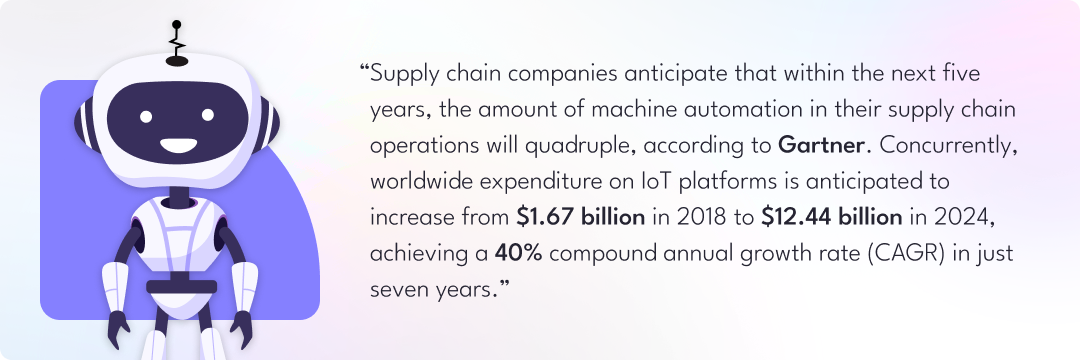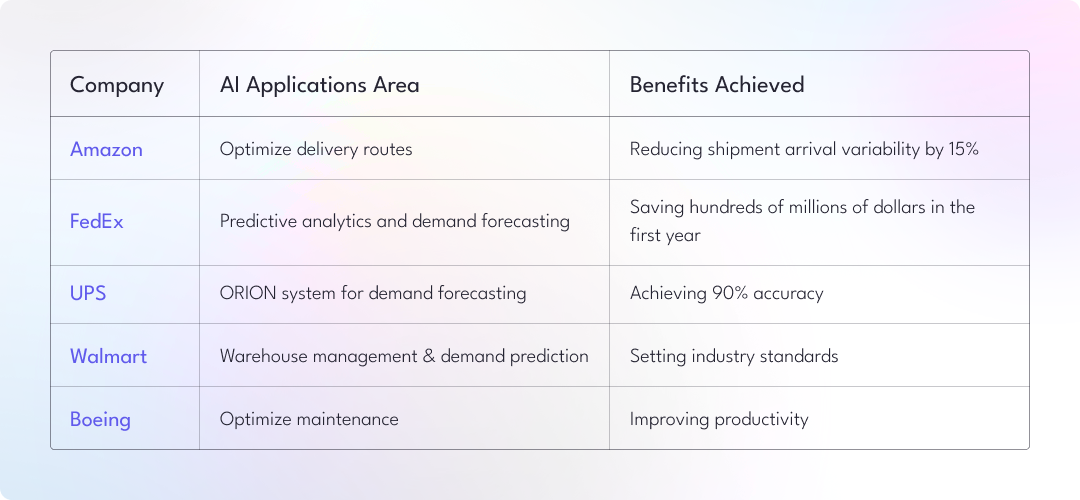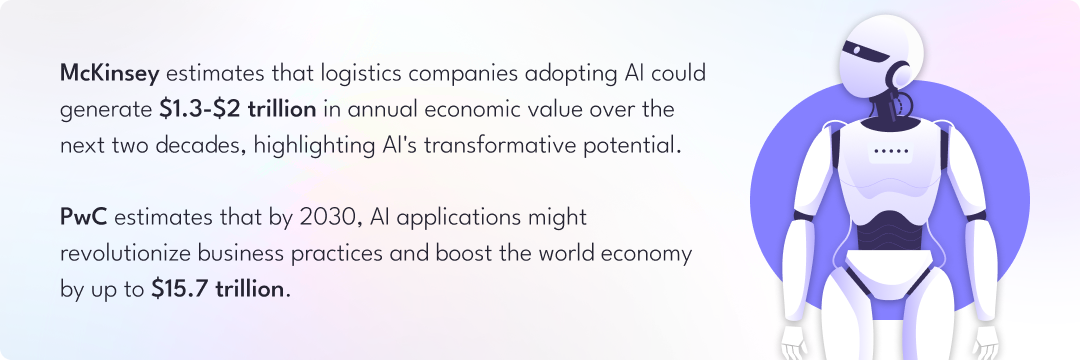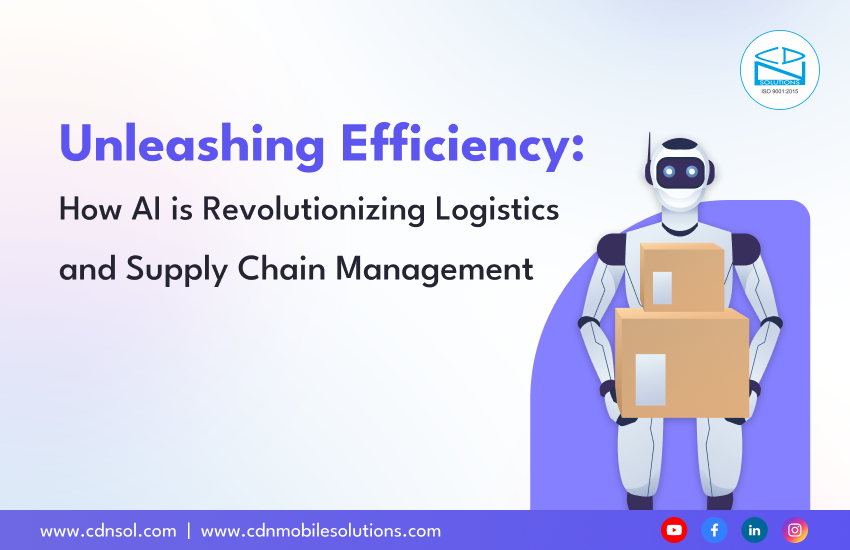Like most sectors, the logistics and supply chain industry is also undergoing a significant shift, and for good. At the heart of this transformation is Artificial intelligence (AI).
E-commerce is booming, online shopping is raising customer demand, and the load on the supply chain has been unprecedented. Logistics has to keep up with the pace and AI systems are helping logistics companies keep pace with the evolving landscape.
Fast decision-making. Reduced cycle-times. Quick operations. And, continuous improvement. AI in logistics is here to stay and bring huge changes in times to come.
Table of Contents
Artificial Intelligence in Logistics
A subfield of computer science called artificial intelligence (AI) builds machines that can carry out activities that normally call for human intelligence; learning, reasoning, problem-solving, perception, and language comprehension. Different AI-powered software performs these tasks.
Artificial Intelligence is revolutionizing various industries, including logistics and supply chains. AI is perfect for supply chain management and logistics. It optimizes decision-making with its data handling and adaptability. Leveraging AI, businesses are now optimizing operations, improving efficiency, and gaining a competitive edge in the dynamic global marketplace.

Predictive analytics by AI systems can precisely predict demand, detect supply chain interruptions, and optimize inventory levels using historical and current data. This helps companies minimize expenses and deliver customer happiness by making educated decisions about manufacturing, warehousing, and transportation.
AI automates repetitive, time-consuming tasks, streamlining logistics. Automated Guided Vehicles (AGVs) equipped with AI navigate warehouses autonomously, improving efficiency and accuracy in order picking and fulfillment. AI-powered robots can perform sorting, packing, loading, etc reduce the need for manual labor, and increase overall productivity.
AI systems can also analyze data of enormous volumes from different sources like social media, IoT devices, and sensors, to provide insights into consumer behavior and industry trends. This data can help with customer experience personalization, focused marketing strategy development, and finding new company opportunities.
Artificial Intelligence (AI) has enormous potential in supply chain management and logistics, and its use is expanding quickly. AI will continue transforming the market as technology develops, giving companies access to previously unheard-of levels of consumer focus, agility, and efficiency. AI makes it possible for a more automated, data-driven strategy that is quicker, more accurate, and more effective.
AI is Transforming Supply Chain and Logistics
The logistics industry has always required a lot of labor due to manual procedures and a sluggish pace of change adaptability. Now, the whole supply chain is changing, including last-mile delivery, transportation, and warehousing.
- AI improves logistics planning by analyzing real-time data, anticipating market trends, and reducing costs.
- AI automation reduces human error and improves manual processes like data entry, scheduling, and routing.
- AI systems can plan delivery routes, create shipping labels automatically, and even oversee warehouse operations.
- AI-powered automated warehouses save a lot of money as they are quicker, more precise, and require less human work.
- AI finds inefficiencies and makes suggestions for improvements to optimize the whole supply chain.
- AI robots performing warehouse operations automate order fulfillment, inventory management, and product packaging.
- AI optimizes delivery routes using real-time data, reducing delivery times and transportation costs for an efficient logistics process.
Use-Cases of Artificial Intelligence in the Logistics Industry
Several leading companies are leveraging AI to transform their logistics operations. Here are some notable examples:

The Future of Artificial Intelligence in the Logistics Industry
The future of logistics lies in the seamless integration of AI across the supply chain. As AI continues to evolve, we can anticipate even more groundbreaking applications, from autonomous vehicles and drones to advanced predictive analytics. This evolution promises greater flexibility, sustainability, and customer satisfaction.
- Image-processing Models
- Lowering workplace risks aids in preventing expensive accidents
- Find anomalies and subtle patterns in large amounts of visual data.
- Give information that might elude human notice.
- Carry out traffic detection and vehicle tracking in real-time.
- assist self-driving cars and improve collision avoidance and navigation.
- Intelligent Procurement
- Procurement officers sustain global supply chains as per the requirements of the business.
- The required information comes from transaction logs, contracts, and regulatory sources.
- AI lets logistics companies extract insights from unstructured data.
- This analysis powered by AI enhances evaluations of suppliers’ performance and risk.
- Leading to better-informed purchasing choices
- Automatic Vehicles, Drones, and Robots
- AI technologies will reduce time, lower costs, and improve access.
- AI to enable safe and efficient routing for self-driving vehicles.
- AI robots to reduce manual labor and increase accuracy.
- Automation can manage peak demand periods.
- It can scale operations in response to market needs.
- Effective and Sustainable Last-mile Deliveries
- AI will be helpful in cities where traffic delays final delivery timeframes.
- delivery of the last mile using AI-powered route optimization tools.
- Real-time data will be used by systems to optimize delivery routes.
- With innovations like drones, startups are driving a revolution in last-mile delivery.
- Packages will be delivered by drones over small distances without assistance from people.

Challenges of AI in Logistics
AI in supply chain and logistics is promising, but challenges exist.
- Complex Systems: AI systems require extensive bandwidth and specialized hardware. This can be a costly investment as well as a complex process for the logistics business.
- The Scalability Factor: Scalability of AI and cloud-based systems may require more initial users/systems for greater impact and effectiveness.
- Training Cost: AI adoption requires personnel training, which is a significant investment in terms of time and money.
- Operational Cost: AI machines are comprised of many processors that require maintenance and replacement periodically. Replacing parts could increase operational costs and directly impact overhead expenses.
The human factor when using AI
The human element is still vital for utilizing AI technologies. Humans bring special abilities including creativity, emotional intelligence, ethical judgment, and accountability to rather mechanical business processes and operations. The workforce maintains relevance from the intuition, emotion, and cultural sense that humans contribute to it. Bringing AI and humans together promotes creativity and more efficient decision-making across a range of businesses. AI should not take the place of humans; rather, it should augment them.
Partner with CDN Solutions for AI-Powered Logistics Solutions
CDN Solutions Group can assist you if you are interested in investigating AI’s possibilities for your logistics company. Our area of expertise is creating AI-driven logistics solutions that decrease risks, increase efficiency, and automate and streamline processes.
Supply chain management solutions, logistics application development, dispatch management software, parking management software, fleet management software, and ERP logistics systems are some of the services we offer in addition to specialized transportation and logistics management.
With more than 4.7 million hours of work, CDN Solutions Group has over 24+ years of expertise serving clients in more than 270 countries. In the logistics sector, we provide top-notch solutions that boost production, efficiency, and competitive advantage.
Get in touch with CDN Solutions Group right now to find out how we can assist you in utilizing AI to revolutionize your supply chain and logistics processes.

